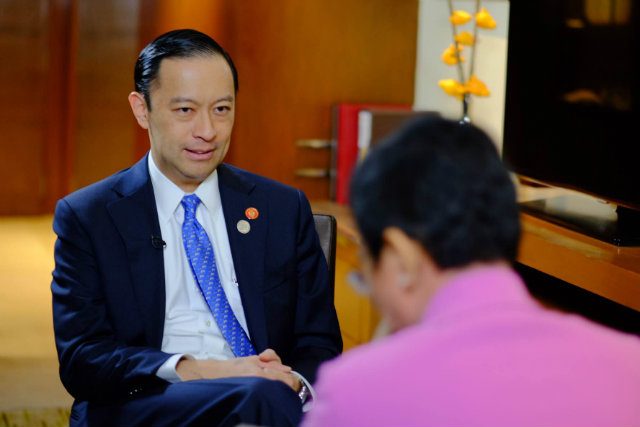SUMMARY
This is AI generated summarization, which may have errors. For context, always refer to the full article.

MANILA, Philippines – Indonesian Trade Minister Thomas “Tom” Lembong said Jakarta can meet the rigid demands of a landmark US-led trade deal despite the skepticism of critics at home.
Lembong made a renewed push for the Trans-Pacific Partnership (TPP) on the sidelines of the Asia-Pacific Economic Cooperation (APEC) summit here, where US President Barack Obama will lead the first meeting of TPP leaders since the deal was finalized in October after 5 years of negotiations.
In an exclusive interview with Rappler’s Maria Ressa in Manila, the former investment banker said the statement of Indonesian President Joko Widodo, known as Jokowi, that Jakarta will join the TPP was an expression of “self-confidence” in Southeast Asia’s largest economy.
“My personal take is what President Jokowi is signaling by saying we want to join TPP is we want to be first class. We don’t want to be second class. I think we have every reason to be confident that we can, and we should aim for the highest standards,” Lembong said on Monday, November 16.
The TPP is a trade deal involving 12 countries aimed at lowering tariffs and duties on products ranging from rice and sugar to cars and manufactured goods. Obama calls the TPP “the highest standard trade agreement in history” as it sets stringent requirements like ensuring workers’ rights, and intellectual property protection.
The deal includes Australia, Brunei, Canada, Chile, Japan, Malaysia, Mexico, New Zealand, Peru, Singapore, the United States and Vietnam – all APEC member economies. It creates the world’s largest free trade area, accounting for about 40% of global economic output. (READ: FAST FACTS: The Trans-Pacific Partnership)
While meeting Obama in the Oval Office in October, Jokowi said that Indonesia intends to join the TPP.
Lembong acknowledged that Jokowi’s remarks drew criticism from economic nationalists.
“The TPP is very ambitious. It promulgates the highest, most modern, most progressive practices,” Lembong said. “Much of the controversy in Indonesia has this undertone of ‘Are we ready? Can we do this? This is too difficult for us.'”
Former president Susilo Bambang Yudhoyono and the opposition Great Indonesia Movement Party (Gerindra) party criticized Jokowi’s statements, saying the local market will be “flooded with goods and services from other countries.”
The Harvard-educated minister though said that Indonesians must take a different view.
“I just don’t see why we should think that way. We have so many success stories. We’re one of the fastest-growing major economies in the world even with the slowdown. Our society is well-regarded for our diversity, for our democracy, for our moderate Muslim practices, for our humor, for our inventiveness,” Lembong said.
Lembong echoed the pronouncements of Obama, who also cited Indonesia’s population of 250 million, leadership in the region, religious tolerance, and democratic traditions as reasons to boost US-Indonesian ties.
The minister has said that it will take two to 3 years for Indonesia to sign on the TPP.
Besides Indonesia, the Philippines, South Korea, Taiwan, and even Colombia expressed interest in joining the TPP.
‘Do we follow or get left behind?’
Lembong acknowledged that protectionist measures in big countries like Indonesia took a toll on economic growth.
He said the Jokowi administration is aware of the problem, and will take steps to reverse this.
Jokowi faced vested interests seeking to protect favored local industries like banking, mining, and telecommunications.
Yet the Indonesian leader began firing protectionist cabinet members, and Lembong’s appointment is itself seen as a step to address the issue.
Lembong said regional competition will pressure Indonesia to open up its economy.
“Who would have thought suddenly Vietnam, and now potentially Myanmar, are leading? Vietnam in economic opening and economic modernization, and Myanmar now with political [opening]. Vietnam is stunning everyone by successfully wrapping up a trade agreement with the European Union, and simultaneously being part of TPP. It’s very bold, very courageous, very advanced, very progressive, forward-looking,” Lembong said.
Only Vietnam, Malaysia, Singapore, and Brunei are the Southeast Asian nations that signed up for the TPP.
Analysts said Vietnam will be a big winner in the TPP, as the deal will boost its foreign investment, and expand its market for key exports like clothing and rice.
Lembong said: “Countries like Indonesia, maybe the Philippines, we have a choice: Do we follow or do we get left behind?”
The minister added that Indonesia’s economy must reflect the openness of its culture.
“We’re not a close, defensive culture; a culture of losers. We’re a culture of winners. We’re a confident society. We’re very diverse, full of tolerance for each other so our economic policy, our trade policy should be like that. Maybe there are other countries with a culture of being closed, and defensive. I just don’t see where that applies to us,” said Lembong. – Rappler.com
Add a comment
How does this make you feel?
There are no comments yet. Add your comment to start the conversation.